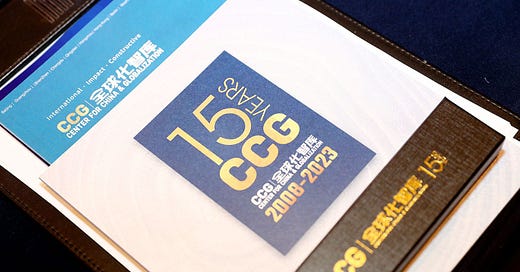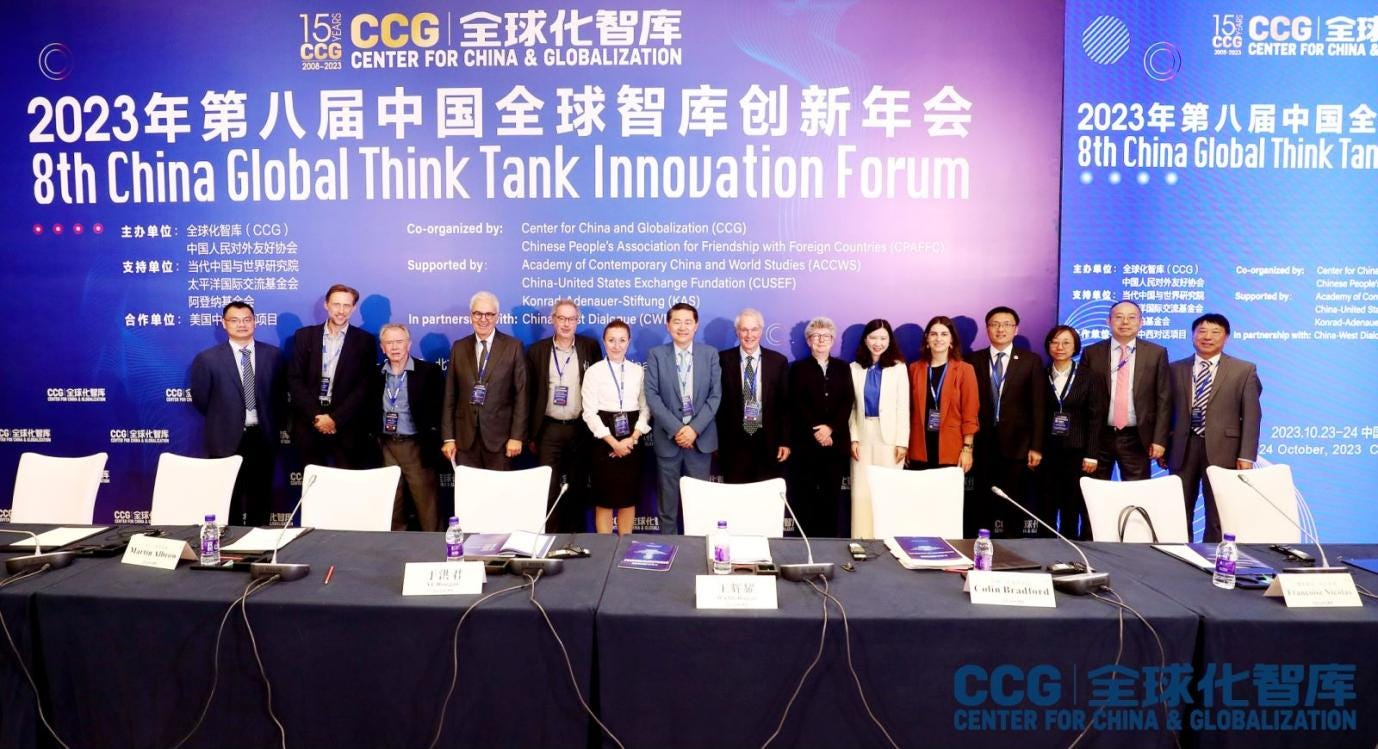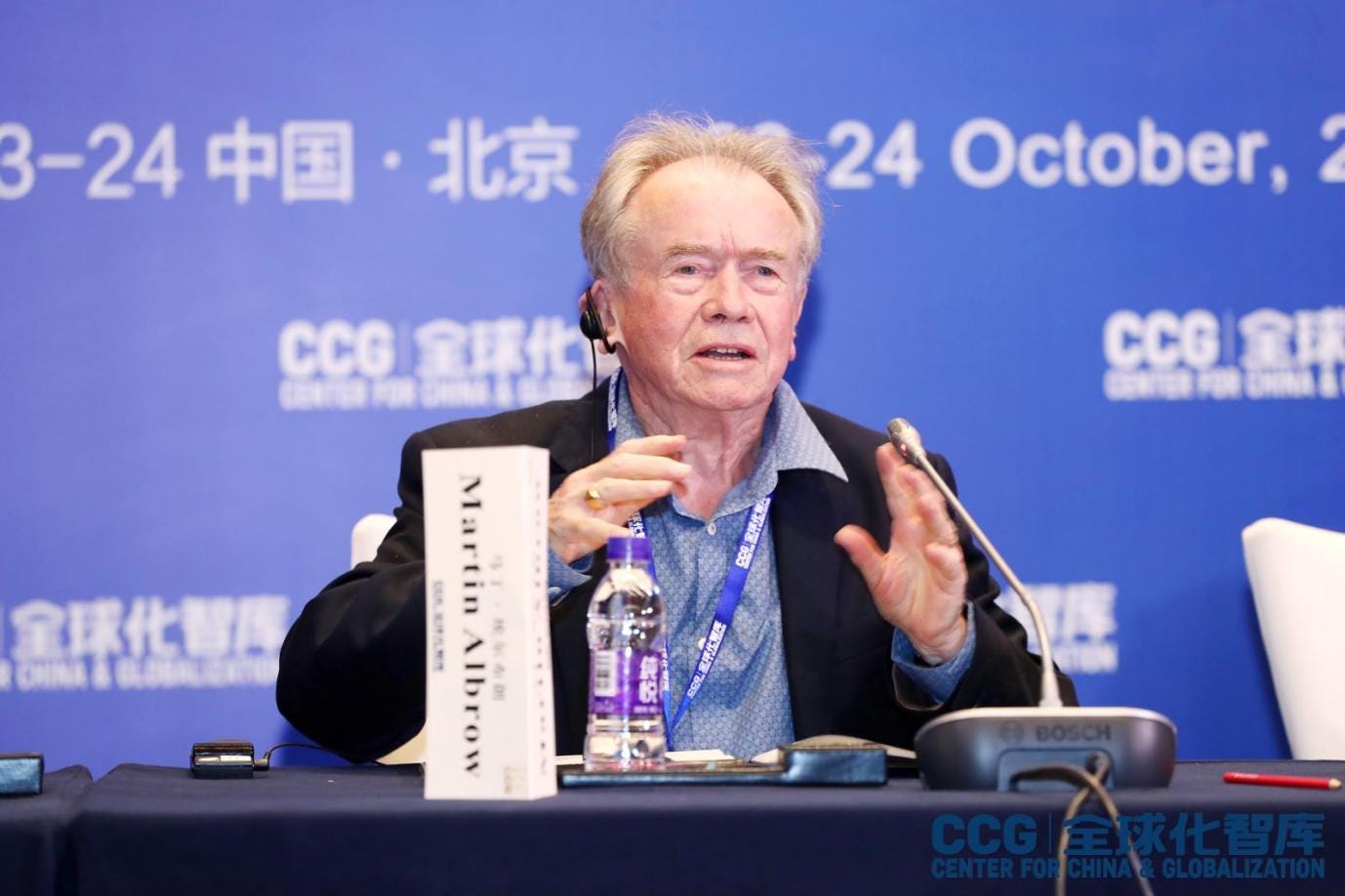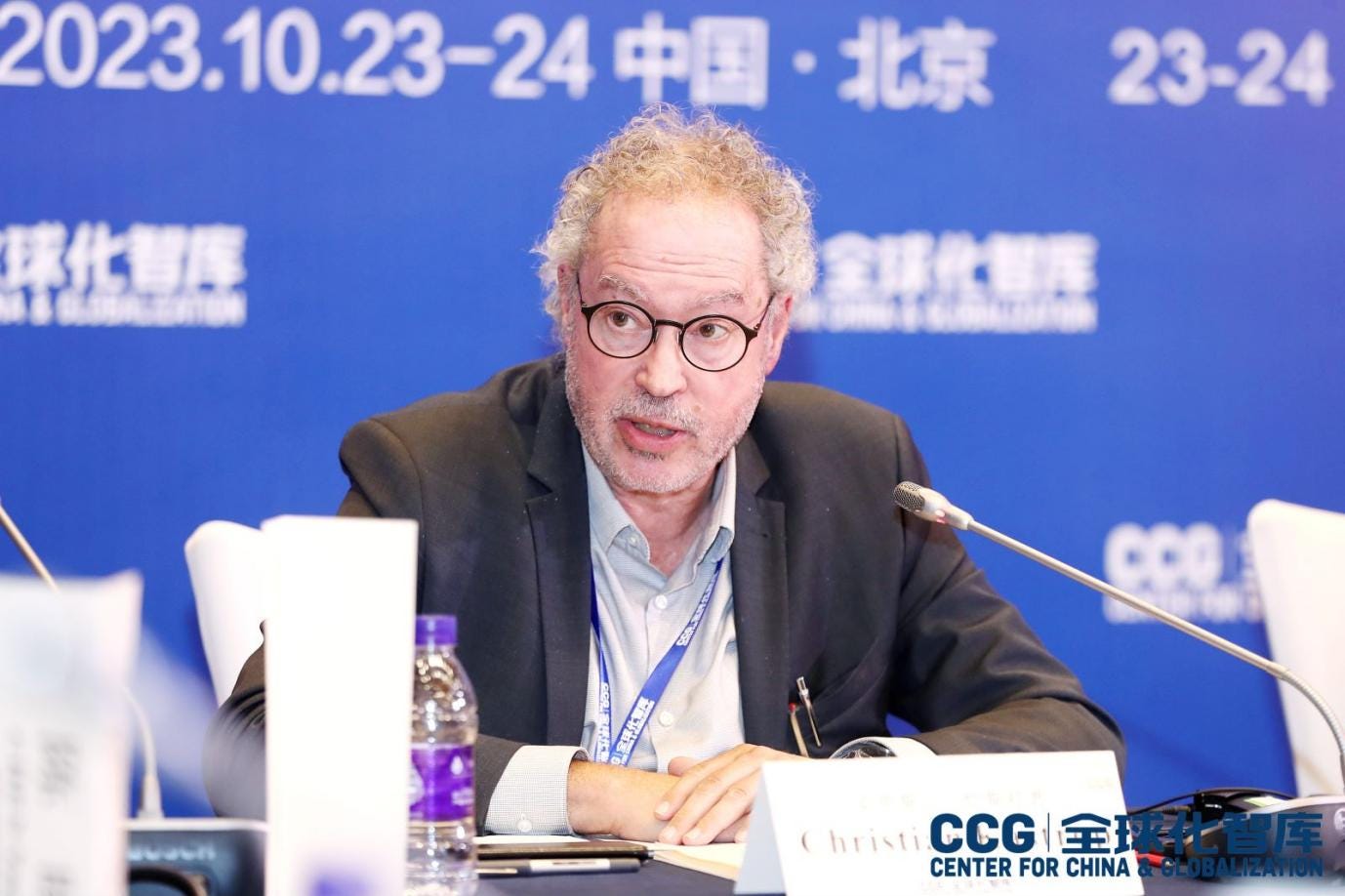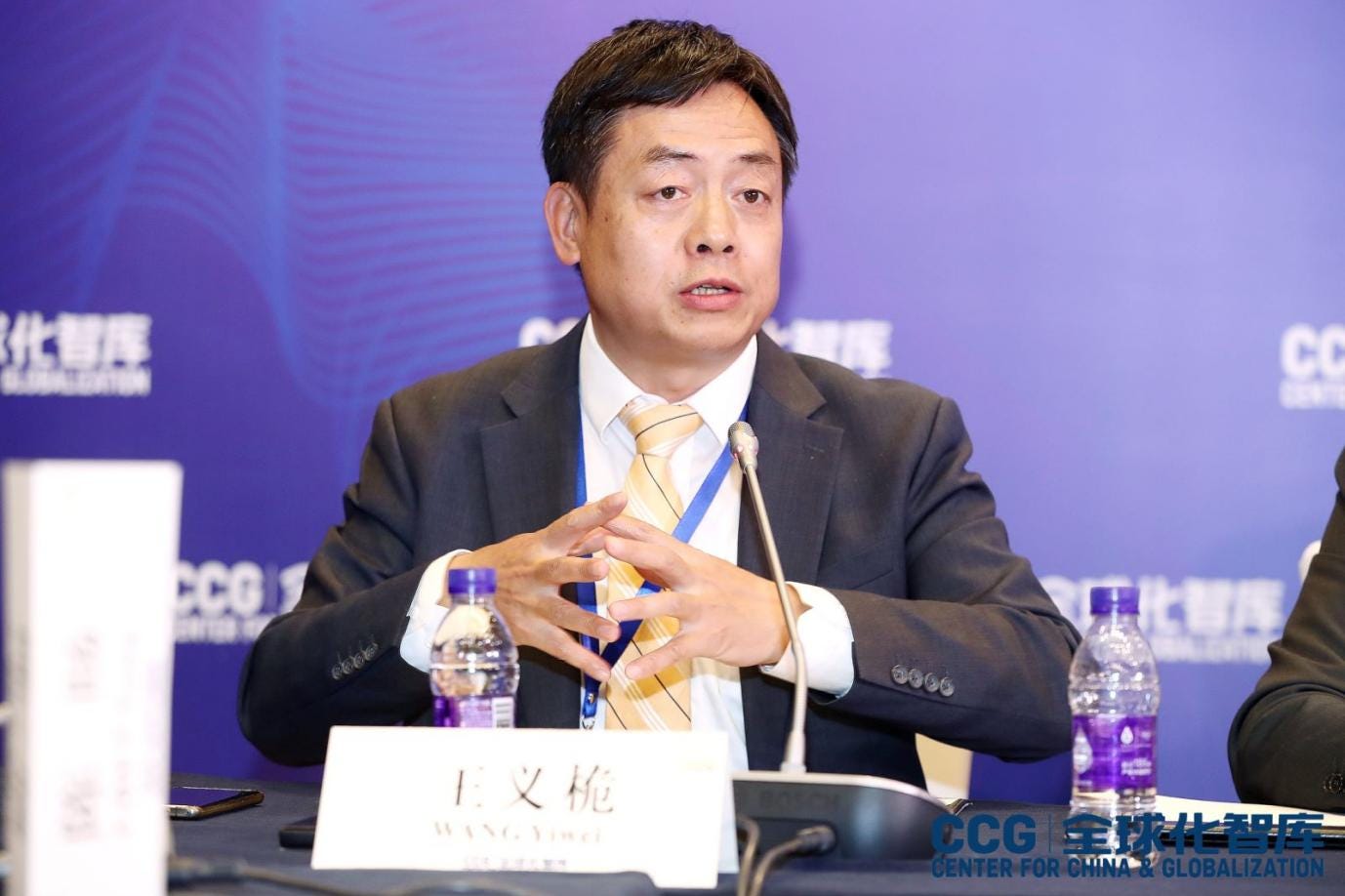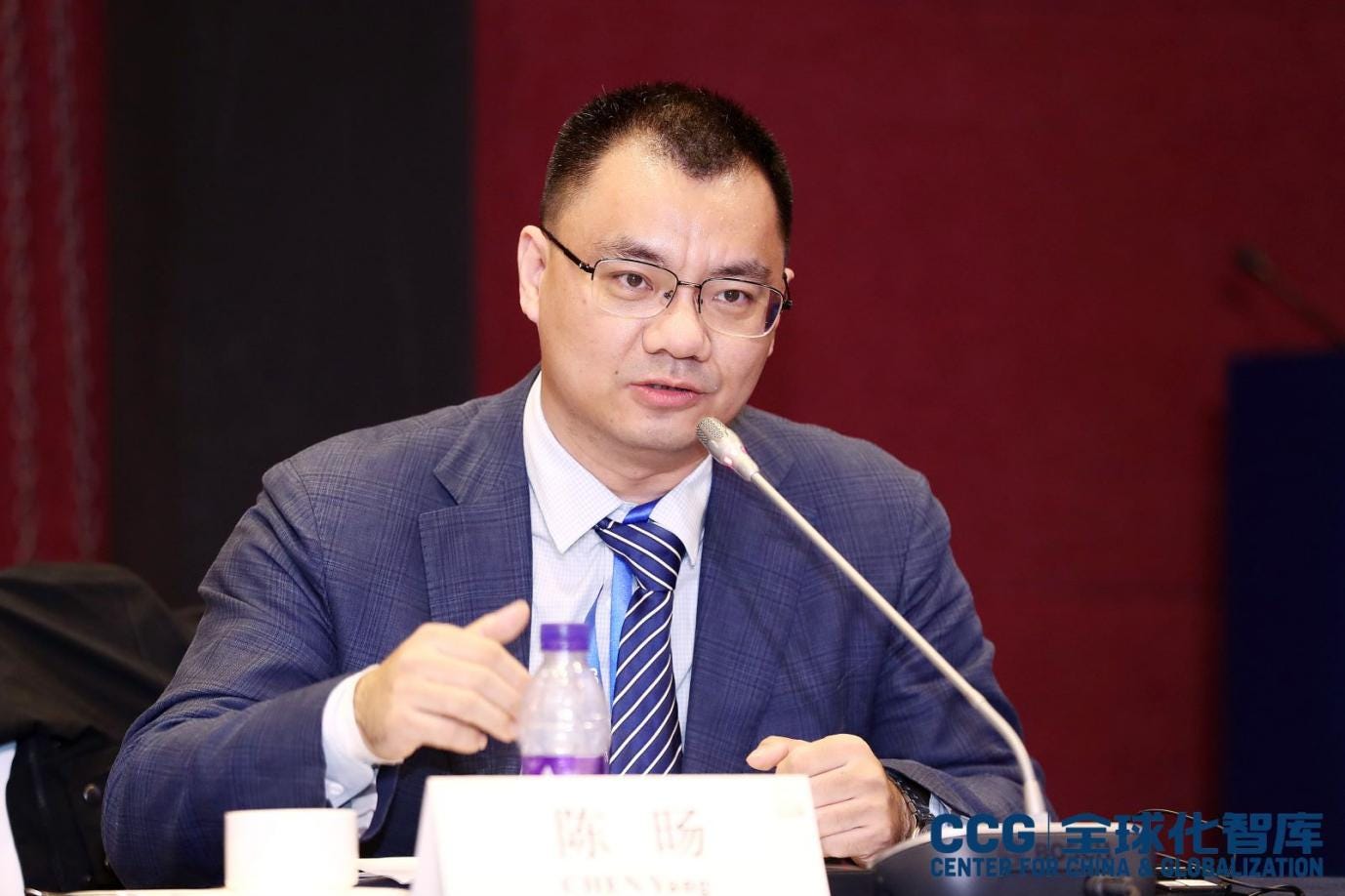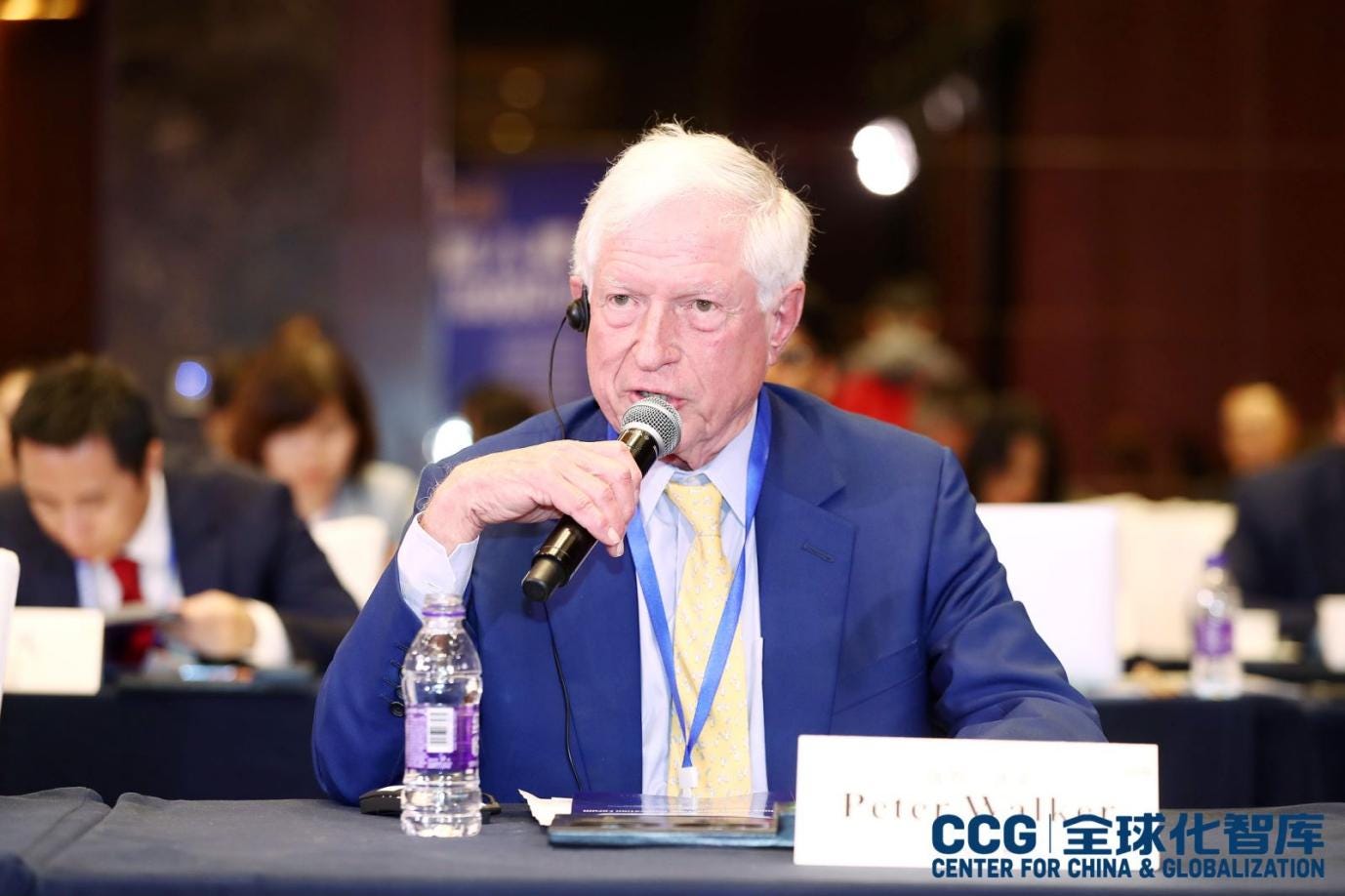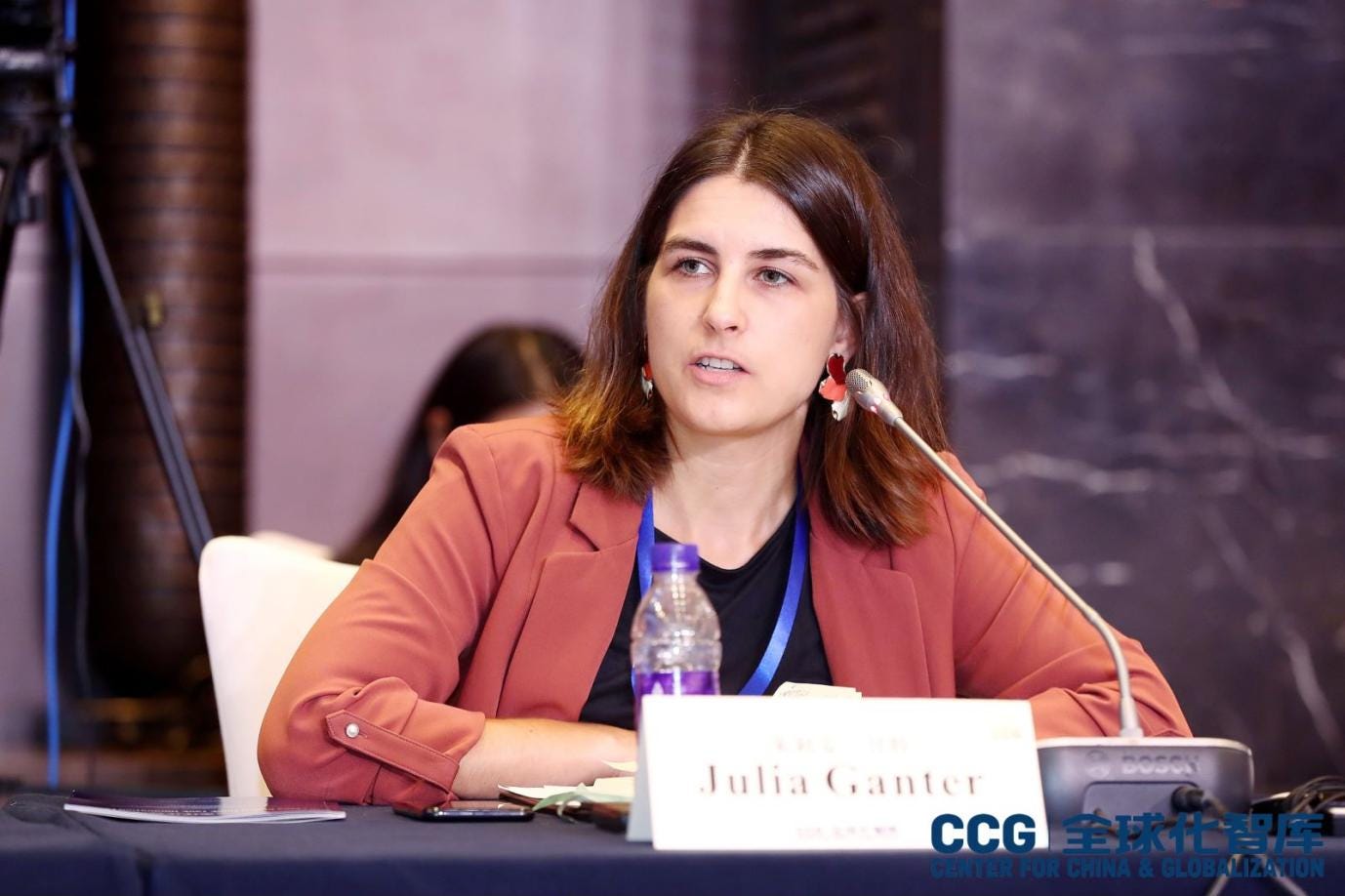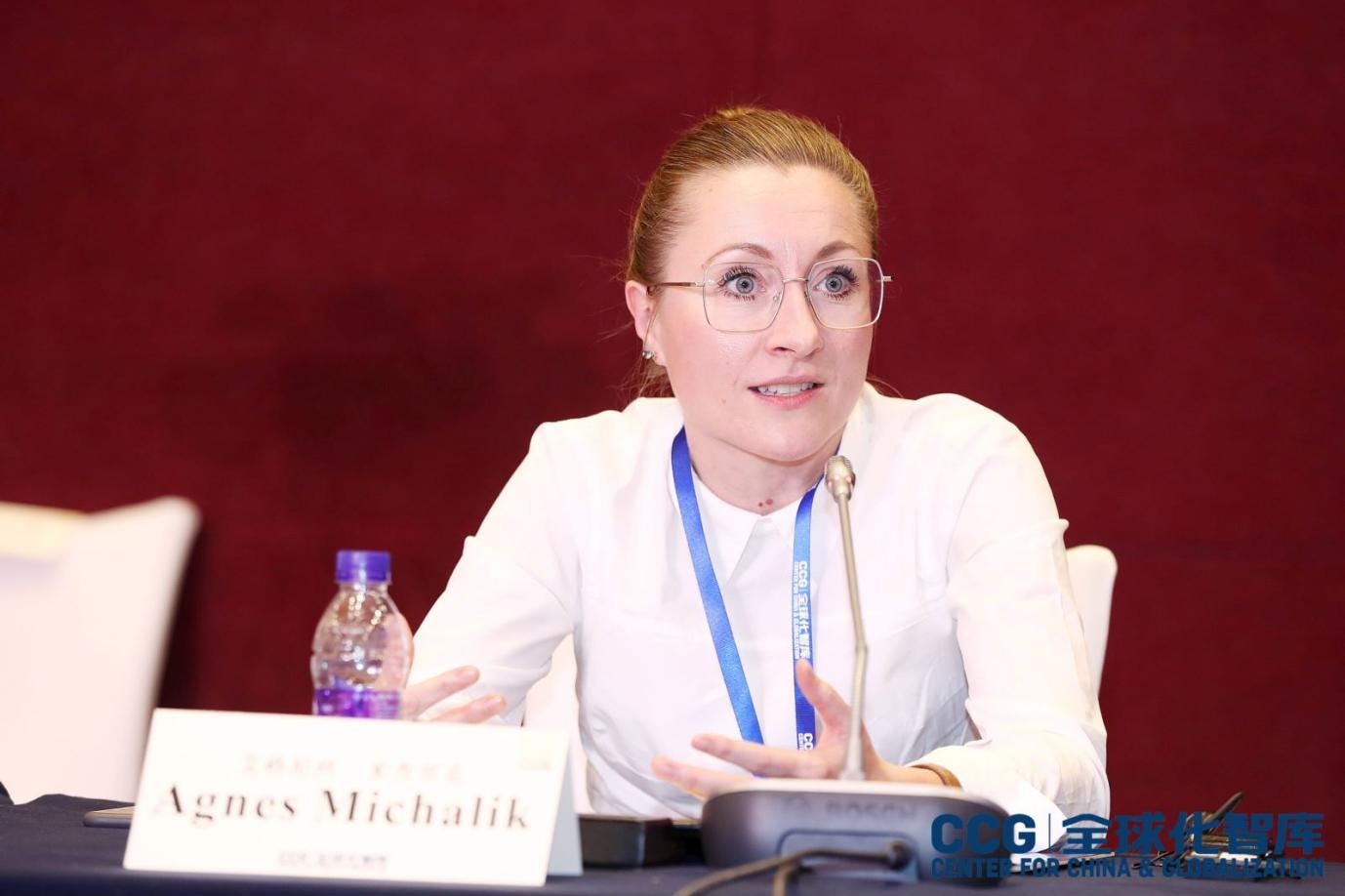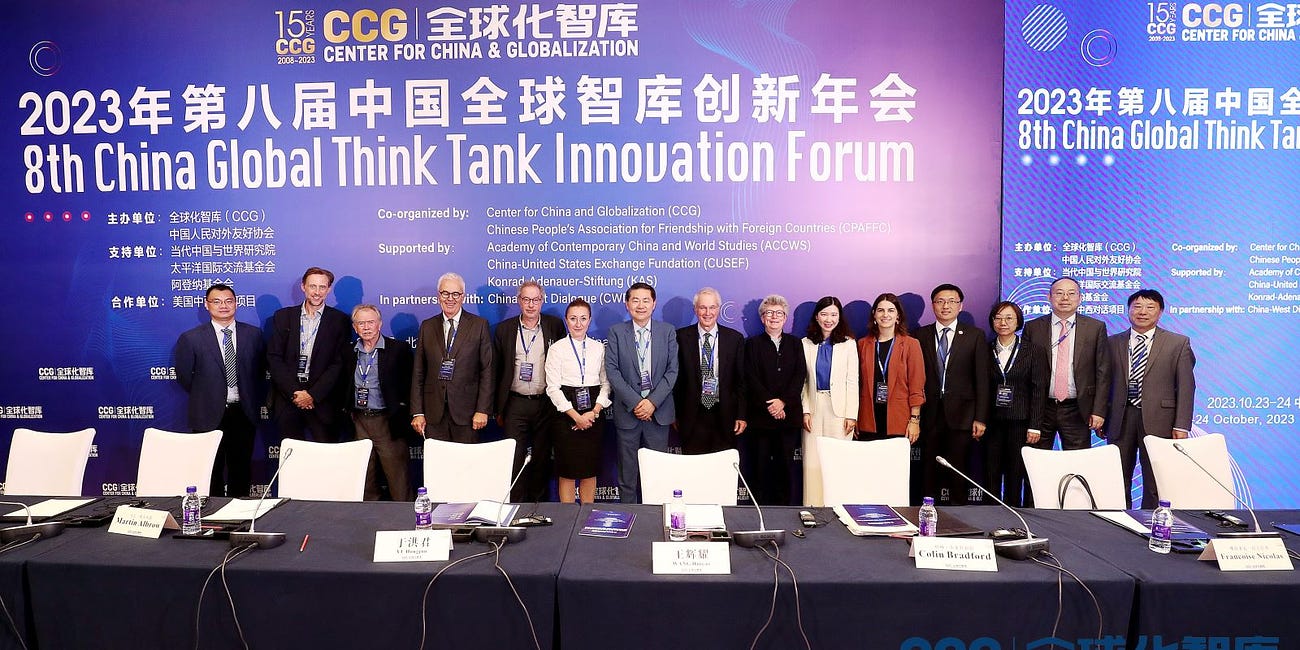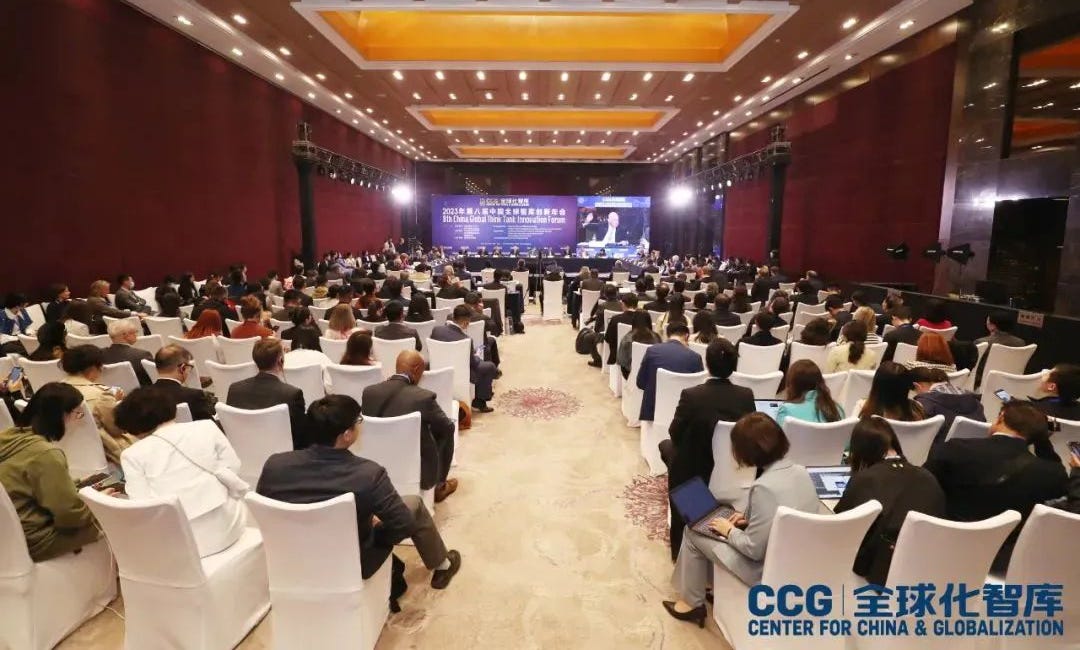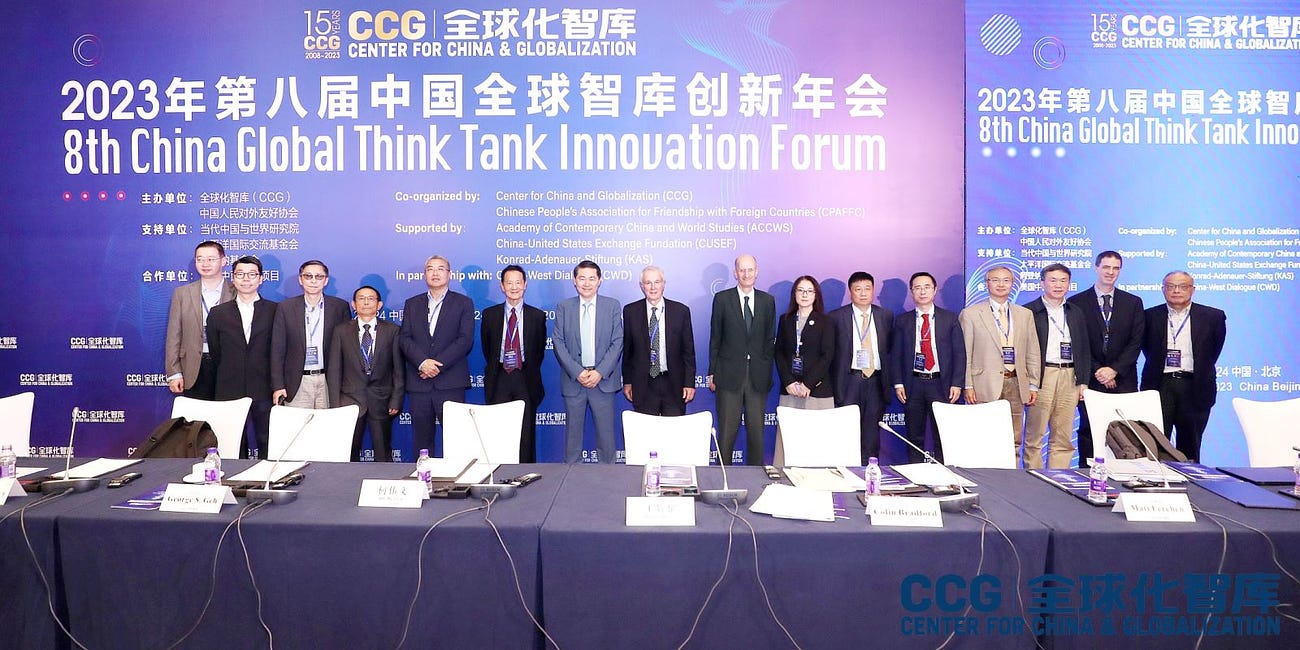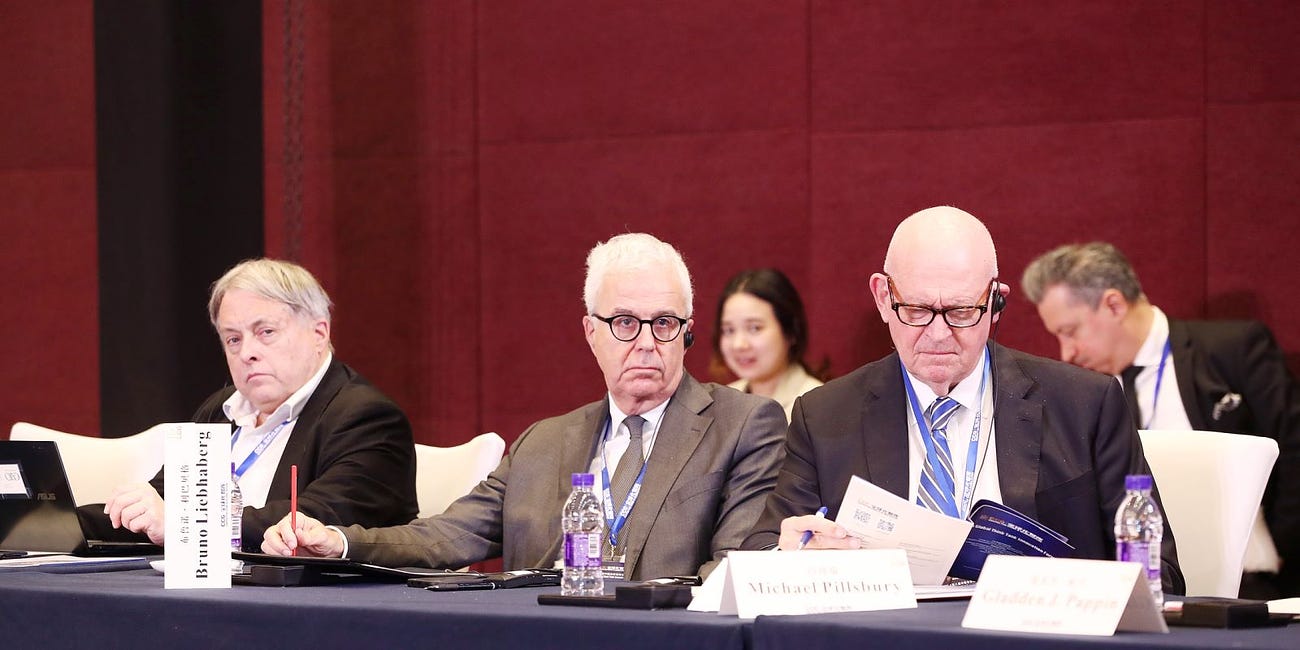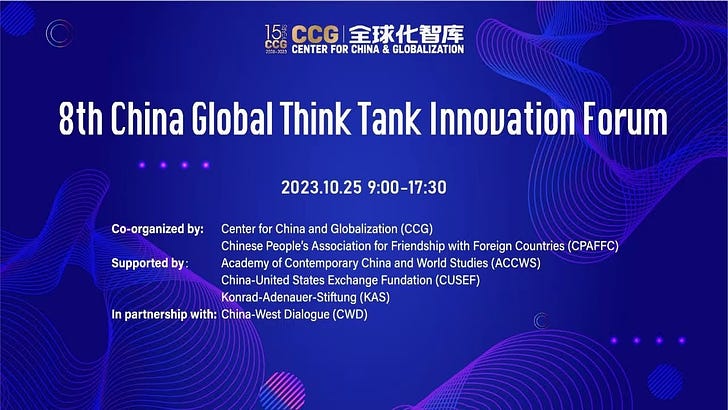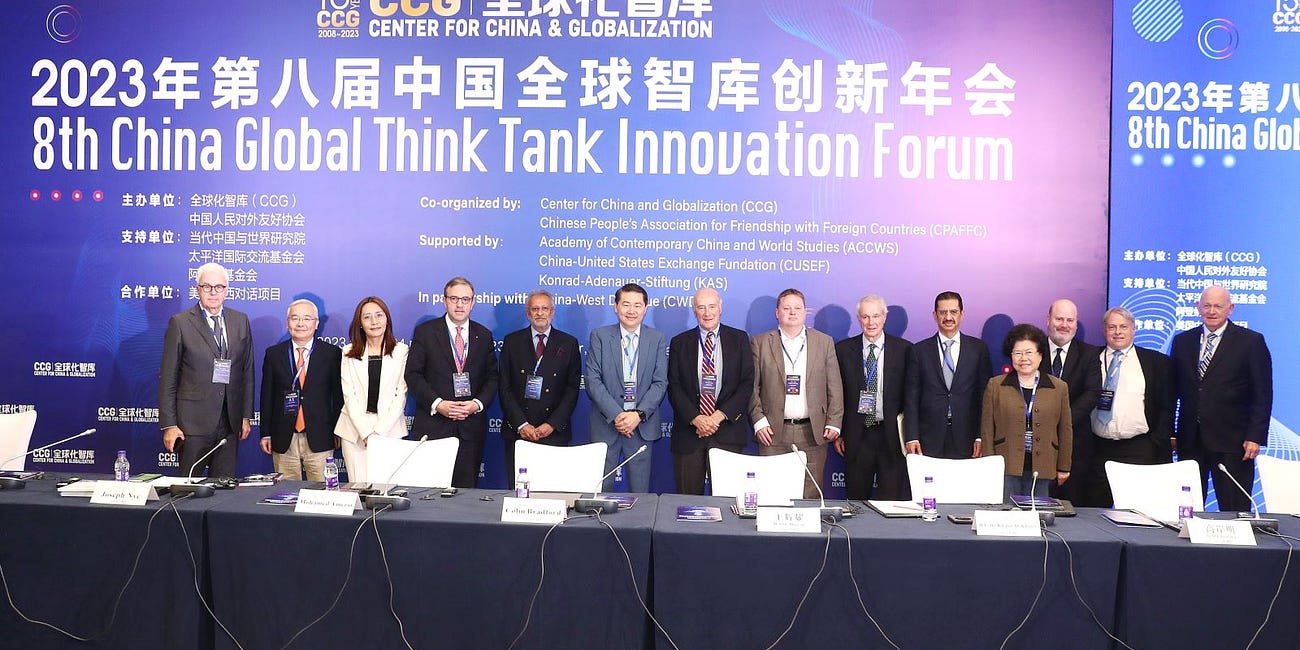Part II: International Norms and Global Engagement Platforms
Martin Albrow, Christian Kastrop, WANG Yiwei, CHEN Yang, Tim Summers, Gladden J. Pappin, Peter Walker, Richard Walker, Julia Ganter, ZHANG Wei, and Agnes Michalik.
Hi, this is Jia Yuxuan at CCG. For the past two weeks, we've been sharing transcripts from the 8th China Global Think Tank Innovation Forum on Oct. 23 and the EU & China Think Tank Exchanges on Oct. 24, and I hope you found them valuable.
Today, I am pleased to bring you Part II of the transcripts from the "International Norms and Global Engagement Platforms" roundtable from the Oct. 23 event. This also marks the conclusion of our transcript series.
The consolidated file of the whole day's sessions on Oct. 23 is also available for download.
The roundtable was the closing session of the 8th China Global Think Tank Innovation Forum organized by the Center for China and Globalization (CCG) and Chinese People's Association for Friendship with Foreign Countries (CPAFFC), supported by the Academy of Contemporary China and World Studies (ACCWS), China-United States Exchange Foundation (CUSEF), and Konrad-Adenauer-Stiftung (KAS), in partnership with China-West Dialogue (CWD).
The full video is available on YouTube. It was also broadcast online by CCG and remains available in China both in English and Chinese.
This transcript covers 11 speakers:
Martin Albrow, Emeritus Professor of the University of Wales and Fellow of the Academy of Social Sciences (FAcSS)
Christian Kastrop, Professor for Public Finance at the Free University Berlin; former State Secretary, Federal Ministry of Justice and Consumer Protection, Germany
WANG Yiwei, CCG Non-resident Senior Fellow; Jean Monnet Chair Professor and Director of International Affairs, Renmin University of China
CHEN Yang, Executive Director of Institute of European Studies, China Institutes of Contemporary International Relations (CICIR)
Tim Summers, Assistant Professor, The Chinese University of Hong Kong; former Chatham House Consultant Fellow
Gladden J. Pappin, President, Hungarian Institute of International Affairs
Peter Walker, Co-Chair, China Institute in America
Richard Walker, Chief International Editor, Deutsche Welle
Julia Ganter, Programme Director International Affairs; Editor-in-Chief, The Berlin Pulse, Körber-Stiftung
ZHANG Wei, Co-Director, Professor of Law at Institute for Human Rights, China University of Political Science and Law
Agnes Michalik, Managing Director, The Global Solutions Initiative
Martin Albrow, Emeritus Professor of the University of Wales and Fellow of the Academy of Social Sciences (FAcSS)
Thank you very much, Colin. I wonder if I can be a bit autobiographical. I can remember seeing the destruction of Hiroshima and Nagasaki when it happened. I was very lucky. I was eight years old. In those days, a young kid could go to the cinema and see newsreels. The first newsreel would be about American Cowboys, Roy Rogers. And then, after the film, you would see the passage news. The passage news showed the explosions over Hiroshima and Nagasaki. For an eight-year-old, it was pretty shocking. In other newsreels, you saw the results of the incarceration and the burning of Jews in German concentration camps, and you saw the open pits, the lime pits, and the skeletons. This was a vivid impression for an eight-year-old of what clearly was something dramatic.
And it was marked, of course, by President Truman who said, "We have entered a new era." I think this was probably the first time "new era" was expressed in global politics. Intellectuals of the time followed suit. The great German philosopher, Karl Jaspers echoed that. The great philosopher of civilizations, Arnold Toynbee echoed that. Now, this was the immediate impact of the end of the Second World War. Of course, the end of the First World War had a similar intellectual impact. And Toynbee himself was echoing someone named Oswald Spengler, who wrote a book called "The Decline of the West," a forgotten book now, but Toynbee expressed great interest in it and argued that its message was valid for his day. Toynbee himself, of course, was a great admirer of China and saw China as eventually the civilization that could, in fact, provide a more peaceful world.
Now, I give that as the background to what I'm saying, simply because I think you have to look at the long term, and you also need to take account of the fact that, yes, there was wide recognition of the deep differences between civilizations then, throughout the 20th century. My own feeling is that we possibly overestimate the contribution that understanding between civilizations can bring. After all, let's face it, within the Arab world, the divisions go back 1,400 years or 1,300 years. They still haven't been resolved. That's only within the Arab world.
Misunderstandings at the level of civilization are not something we can allow to impede us in dealing with the existential crises of our time. The first existential crisis was, of course, the recognition that nuclear weapons and the discovery of the power of the atom could destroy human life. The next existential crisis we've already been talking about is environmental pollution and possibly the degradation of the environment to end human existence. The third one came rapidly after, which was global warming. And the fourth one came even more rapidly after that, which is the potential of artificial intelligence to end human life. Four existential crises coming faster and faster.
Honestly, they are not solved by reconciling civilizations. There's no way we can do that because it's not civilizations that negotiate with each other. It's human beings. It's people. It's not even primarily, I would suggest, governments. When we meet as a group of think tanks and focus entirely on what governments do, we forget the fact that the world is now a multiplicity of organizations that cross boundaries. We only think of the most prominent ones, like Greenpeace or the Red Cross, but the multiplicity of organizations is enormous. It's from those that I trust we can see a future. And it's those that I believe will be more important in dealing with existential crises because there we have the experts. We have the people who find out things, create things. They actually handle the technologies. Scientists are there to direct those efforts. And we have to remember, modernization was never led by countries. Modernization was led by scientists, technologists, and so on. So, we ought to be negotiating directly. My view is, broadly, what I've called in the past, global civil society. It's global civil society. We need the next conference, Henry, yes, the next one is for you and your center to have a conference for global civil society. And then, I think we might get a bit further forward in dealing with the existential crisis of the moment for humans on this earth. We don't have a lot of time. We truly don't have a lot of time, in my view.
Christian Kastrop, Professor for Public Finance at the Free University Berlin; former State Secretary, Federal Ministry of Justice and Consumer Protection, Germany
I would first of all, thanks a lot for this conference. That's really a great thing. Also, to the Chinese friends and to the China-West Dialogue, it's really an awesome gathering.
I'm from Global Solutions Initiative, which is kind of an offspring of the G20 group. So, we work with the respective presidencies, and we have rights now starting to work with the Brazilian presidency on their G20 portfolio. And so I will bring more into practice. And I know quite a bit about the G20 because I was part of the program team in the late nineties when the G20 was then a proposal and was then decided at the so-called Cologne Summit. So that's a very interesting history, but I will not allude longer into that. But what we clearly see right now, on top of what happened to the G20, in fact, we really see, and I would support all those speakers before you said that there is a kind of, at least yeah, it's a substantive breakdown of the global governance and over 70 years consensus of an after-war system. And I have to say immediately this is for sure not useful any longer for the global future, for our common global future.
So yes, there's this famous saying, "Houston, we have a problem," and I would say it again, it's not just Houston, but the world. We really have a problem. So, and of course, we have this problem. In spite of all these pressing problems, we have the global commons, the Global Common Goods. And there were mentioned here already. So, it's about, I just had one of the panels of the World Health Summit in Berlin two weeks ago, and it is really, really a big issue. Pandemia is looming again. We have a health issue, uh. We have energy. We have natural resources, which are very uneven, distributed all over the globe. We have an issue with the climate, anyway. But beyond, it's also digital and artificial intelligence. We need to also have some rules of the game here, or say, really, at least a little bit of a common global ethics of what we do with this, also with respect to, to, disinformation privacy and all other issues you all know very well. And of course, they have to be seen in different political environments. And they are all, in a way, to be respected. Let me also say that very clear.
And then there is, of course, the issue of science and technology. Value chains will also change a lot, and this will also influence our economic system to a large degree. We will now talk more about the security of global value chains and about the sustainability of global value chains, and we will probably less talk about ultimate efficiency of global value chains. And so, it's not just the cheapest alternative, it's the best alternative, given all other things of common goods which are involved here. and then let me also mention one point where we really try also to work with our annually Global Solutions Summit in Berlin in May, that's about reducing inequality and really trying to get the people along again. And this is what we mean with the recoupling the global society to the given environment.
So, what are we going to do now? Coming back to my open sentence about that we have kind of a collapse of global governance, and I think I would be rather open in formulating a new, say, global governance system. And I think we need it, and it will take time. I'm pretty sure we will not solve it today or in the next year. But I think we should really accept a multipolarization. We should really accept that every player in the world, and it's not just the old global players from the late fifties or the late sixties, must have an equal say here. I think this is very important. Um, hard to begin.
Maybe we can also check for the new global governance, again, an institutional reform. We would probably also need some front projects where everybody would like to join in. I think we could probably at least define some of them, and it's one of my pet projects, how to define these projects. We need probably also a flexible geometry of global governance, which means that we do not need any more always unanimity. This will probably not possible on all issues, but it may be possible on some issues. And we should really refrain from this issue of building certain blocs. I think we are all sitting in the same boat, as we say, and we will all, and this was also alluded here by my pre speaker, that we, we are all in trouble if something goes wrong on global governance and saving the global common goods.
So, I stop here, and what I would just like to remember you at these very topical points, and we really need to solve them. We need global solutions quickly and soon. we do not have another 50 years to fight several philosophies of these. We just have to do the job. Thank you.
WANG Yiwei, CCG Non-resident Senior Fellow; Jean Monnet Chair Professor and Director of International Affairs, Renmin University of China
The world is transforming from the carbon civilization to silicon civilization. Some people say from industrial civilization to digital civilization, or ecological civilization. I think this is the major background of our discussion.
In China, a political narrative we saw the West is "American-led West," 美西方. But in the digital world, American leadership is relatively declining. That's the reason I think the European Union put forward the digital sovereignty. The European Union wants a strategic autonomy. So, you cannot blame the rise of Europe. The challenge to American leadership isn't a new word.
What are implications for China and the Western dialogue? So, for the United States, I think firstly, you should distinguish what kind of challenges are because of China's rise as a power, so power politics, or because of the world transferring to new civilizations. And then the American political system, or civilization, not adapting to this kind of new trend. And then blame China. It's like this globalization, China as a scapegoat. Putting China as the scapegoat cannot solve the Americans' problem. It's like the trade deficit. It's the American, US dollar, hegemonic power. So, it's not because of China. Made in China too much. So that's very important.
Every country, every civilization, needs to adapt to a new environment. So that's 易经, we learn from that. I think China also found many challenges of the digital civilization. And what's the competition, or dialogue, between China and the West, particularly China and the US? In the morning, many people mentioned about cooperation, competition, but this is always combined together. So, the competition is, who can provide more suitable public goods for the human transformation of civilization? Not public best, that should be public goods. I think the China-US, China-west competition is about that is disregard, of course, cooperation competition combined together.
So, what we understand of this dialogue of China and the West? There's no pure China or pure West. China is in the West. West also in China. It's like we learn from ubuntu: "I am because we are." So, maybe the US defines China. China also defines the US, or the general, or the West. So, the West is not an ideology meaning, but it's also a civilization meaning. It's not the old civilization meaning. It's a new kind of civilization meaning. So, in this regard, I think what's norms competition between China and the West? And we can provide the conclusion is, 1st, we should change that paradigm from the capital-driven to human-oriented scenario. The 2nd, power, and rights always, you know, need to combine together. But it's no power to define rights or right to defend power, they are mutually connected or twin. This is a shared, not as a shared power, shared rise. Even the power and rights also be shared. Thirdly, I think the proposals regionalism of the new initiative competed with each other between China and the United States, for instance, like Belt and Road Initiative, for Americans like B3W, whatever. There is, which community will be most inclusive to every participant on this planet, then may be more welcome. I think the maximum, or the most inclusive, definitely, is what Martin says, a global community of a shared future. Thank you.
CHEN Yang, Executive Director of Institute of European Studies, China Institutes of Contemporary International Relations (CICIR)
Thank you, Chair. My name is Chen Yang. I come from CICIR, the more realistic think tank. When I received the topic about international norms and this global engagement platform, I was a little surprised because I think those concepts are all about global governance. And global governance is a dying concept in such a new era. For example, the chancellor of Germany talked about the "tight winter," and the EU commission, which used to be a strong supporter of global governance, now wants to build the geopolitical commission.
I was so delighted to see so many idealists here to participate in this meeting, to talk about global governance. Frankly speaking, I do not think it's the right time to talk about that. Domestic issues occupy priority in so many countries' agendas, especially big powers. And under this extent, with persistent geopolitical confrontation, there isn't much space or dynamic left for cooperation on international issues.
I just came back from a trip around Paris and Berlin. I heard so many people talk about China. Sadly, I have to say, most of them are negative: de-risking, systemic rival, economic competition with China, and recently, the panic of the Chinese EV. They said China had dramatically changed its economic, political, and foreign policy style. They mentioned COVID, support for what they perceive as "evil Russia" or Putin, and confrontation with the United States as the causes of the change. We have to change our policy time and time again. And one day, when I woke up, I looked in the mirror. I said, this guy hasn't changed. During the meeting, I looked at the guys around the table. I saw they haven't changed either. But why? Why are there so many differences? Suddenly, I realized that Europe's perception of China has changed. I don't want to judge whether this change is right or wrong, but we have to recognize that it exists and will pervade among social groups for a long time. And they reduce the trust between China and Europe, adding a burden to cooperation in this relationship. Nowadays, as Russia once threatened war and the United States' hostility towards China grows, if Europe and China cannot build mutual trust, the world might tear into two opposite blocs. Who can global governance then count on? So, we need to do something to save the paralyzed systems of our world to avoid human civilization from falling apart.
Firstly, in my personal view, we should focus on facts, not some exaggerated language. Just like saying Europe's security depends on the US, and its economy depends on China. I don't think it's true. If you look at the FDI, China accounts for only 7% of Germany's outflow FDI; the US accounts for 22%. Many scholars criticize China for supporting Russia or Putin, but that's not accurate. If China sided with Russia, the whole dynamic of the Ukraine conflict would change. Many articles and papers suggest China's ambition is to surpass the United States and dominate the world. That's not accurate. You can find many articles and papers discussing great rejuvenation, but none mention dominating the world as the number one superpower. It's not in Chinese culture, nor is it listed in the Chinese dream. We should not fall into these perceptions or negative traps. For example, the three dimensions of the Sino-European relationship. We all know there are many differences between China and the EU. They've always been there and haven't changed much since Sino-EU relations were established. But if we put these differences into a strategic guide, they could seduce people to focus on the differences and turn their policies more defensive, rather than cooperative. Also, regarding the decoupling between China and the USA, in my view, there's no "coupling" between China and the USA. There's always been De-Risking. If you emphasize De-Risking, perhaps the real "risking" will emerge.
Secondly, I think we could explore some areas that urgently need global governance. Like the professor mentioned about nuclear weapons. In today's world, the threshold for using nuclear weapons seems to be declining rapidly. Nuclear proliferation seems unstoppable. We need a new mechanism to prevent the use of nuclear weapons. I was afraid when someone said the nuclear age is coming. It's very dangerous. Another area to consider is AI. One of the reasons I think Ukraine resisted the powerful Russian attacks, and why Hamas challenges the dominance of the Israeli army, is the joint participation in the world. If wars increasingly resemble media games, conflicts could erupt anytime, anywhere. There's an old saying that the earth turns with or without you. I sincerely hope that won't be the destiny of human beings. Thank you. That's all.
Tim Summers, Assistant Professor, The Chinese University of Hong Kong; former Chatham House Consultant Fellow
I want to comment a little bit on the concept of pluralization. And I think this is a very powerful concept for the reasons that you set out earlier, Colin. I think it does a lot more conceptually for us than the idea of multipolarity, and it helps cope with the century of complexity and uncertainty that we're currently facing. It seems good as a method, as a sort of intellectual method, but also as a policy approach to bring more players into the discussion. I think it can also operate as a norm, which is the subject of this current panel. You know, it's a good thing in its own right.
And based on that, I had two slightly granular comments relating to your initiative. The first of those, if you don't mind me making this comment, is I just wonder if the name "China-West Dialogue" really does justice to the richness of the concept of pluralization. It sounds a little bit binary and perhaps a little constraining. So, I wonder if, in a further development, you've got a way of headlining that notion of pluralization a little more. I confess I wasn't very familiar with your initiative until the preparation for this meeting.
[Colin Bradford: Let me just respond to that straight away. First of all, I mentioned this morning that we founded this in 2019, with eleven people in the room, one of whom was Nicolas Veron. They were all from France. And he immediately objected to this, and with good reason. But we sort of ploughed ahead, and it seemed not to detain us too much. However, what happened later was it came up again, maybe provoked by Nicolas or not—I can't remember who provoked it at that point. And a few of us did spend an hour or two kinds of thrashing it out, trying to think of something else. To make a long story short, we just couldn't find anything else that was better. But it is problematic, and we understand what you mean, so...]
Well, thank you, Colin. Unfortunately, I wasn't able to think of anything better myself. So, I can't contribute more meaningfully to that discussion now. But my second comment, I think, on the outline—the one-page outline—you have a reference to establishing dialogues to replace confrontational narratives. And I think that is an incredibly good and important objective. But for the reasons that many people have outlined here, including the excellent comments from our previous speaker, Mr. Chen Yang, confrontational narratives are not going to go away. They won't be replaced. They're not, unfortunately, replaceable for reasons of domestic politics, for reasons of international structure, interests of power, and so on. I wonder if the concept of pluralization can be applied to this. Rather than replacing confrontational narratives, we might seek to find ways to pluralize the narratives that exist.
Clearly, those narratives are very negative about China in Europe at the moment. I entirely agree with the previous speaker on that. But trying to find space and encouraging a broader range of narratives is essential. There are alternative narratives, but they tend to be at the opposite end of the spectrum from the very negative ones. There's not much in the middle. There's not much space in the middle. And those of us who sometimes try to occupy that space with things we say often find it very challenging. So, pluralizing narratives, I believe, might be a more realistic and, in the long term, perhaps a more productive goal than trying to replace them with dialogue or alternative narratives. I apologize for being slightly granular on your concept note, but I found it very inspiring. I believe the concept of pluralization holds significant power, and I wish you every success with the initiative. Thank you, Colin.
Gladden J. Pappin, President, Hungarian Institute of International Affairs
I just wanted to put one additional topic forward, not to open another aspect of discussion. But when we talk about international norms and sustainable development, I think from the Hungarian perspective, one issue that has typically been missing in those conversations, but it's an issue that we encounter directly and tried to come up with a solution for, is demography and family formation.
A society that is forming families, in which people are having children, is a growing society and one which can be more economically dynamic. A society where families are not forming and where children are not being born and raised, is one that becomes more sclerotic and more oriented toward a different type of industrial production, toward medical services and things like that. And this does, I think, relate to, I think for the most part, it's been considered a part of domestic policy, you know, what are the policies that a country pursues in order to incentivize family formation, family stability, etc.
But I think it should actually be considered as at least one aspect of international discussion. And I think if we check back in on this conversation five or ten years from now, by that point it will be and so we might as well go ahead and start to think about it a little bit now. I mean, through most of human history, family formation and the production and raising of children has just been taken as a given, as an input. And if anything, in the latter part of the 20th century, international institutions were a little bit more oriented toward concern about overpopulation. And there was a thought that maybe migration is something that could solve this problem. Because there are some parts of the world whose industrial development is inadequate to their population. And there are other parts of the world that, the Western parts of the world, are not forming families and children as frequently.
Hungary encountered this problem because we had a declining birth rate from the middle of the 1970s until 2010, and the country was basically bleeding population. And so we reoriented our social services systems to promote marriages and family formation. There has been an almost 90% increase in the number of marriages per year in the last 15 years. So I don't want to go on a long rant about this, but I think it is something that's worth considering because, if we think about geopolitical conflict, I don't have a well-worked-out theory about this, but it seems that there's something to it that an aging society is more averse to risk, it's more inclined to hoard its wealth and try to keep that for itself and pass it on, a younger society, at least in an industrially successful place, has a more risk-taking, more conceivably, it could have a more positive approach.
So again, I haven't thought it through, but I do just wonder if some of the urged word, you know, decoupling, de-risking, and the divergence and separation of the world economy is motivated in part by this fear. But anyway, for that reason, and a lot of other reasons, I think in the future, this topic will probably have a place in our discussions.
Peter Walker, Co-Chair, China Institute in America
Well, let me tell you just a little bit about my background. I spent many years at McKinsey focused on business. I did over 80 trips to China, serving many Chinese SOEs in the financial services world. And I never was an author, and I wasn't inclined to write. But I got so tired of every time I came over, reading the US press, and what was said about China and how naive and wrong it was. So, I wrote a book called "Powerful, Different, Equal."
Long story short, when I put it on the market in the US, my royalties took me out to dinner at a mid-sized restaurant with no wine in Manhattan. There was no interest. I went to The Times, I went to the Journal, I went to the FT, which I thought were pretty thoughtful editorials. The response was always the same; there's no market in our audience to hear that story. So, I had it translated into Mandarin; it actually did very well in China, not because it was pro-China, simply because it was balanced.
So, on this whole issue of what can be done constructively on the relationship? I think one hidden asset we have that could be tapped much more aggressively. I spent a lot of time with senior executives in the US over my career. They are by and large totally opposed to what the US is doing to the China relationship. But it's so polarized from a political point of view that every time I finish up a conversation, the response is, "don't use our name." But if you look at the long-term interest of these corporations, they have a lot of clout, they have a lot of market presence, they have a lot of capital, they want to come to China. And they're hesitant right now. Why? Because they want stability for a long-term investment. They are very nervous about the whole issue of favoring SOEs at the expense of private enterprise, even though private enterprise accounts for over 100% of the wealth creation in China over the last ten years. But they would be ready allies. They would like to see a much more laser-focused approach to national security, a much more laser approach to tariffs that met genuine security needs, as opposed to things that were basically political in nature. So, I think that could be a very important source of support once we get through the election in the US, and it's no longer the hot topic of the day.
The last thing I'll say is what would be helpful on both sides of the equation. First of all, the US really should stop lecturing China on its domestic policies. All it does is anger China. It has absolutely no positive impact on anything. And the other thing is, China just needs to be sensitive to every time they criticize the US; the media completely eats it up, and it's all over the papers. And so for all the people that you would want to influence over time, every comment about the US being in decline, whether it's true or not, or any other criticism, is just feeding the flames, and it's very counterproductive. Okay, that's all I wanted to say.
Richard Walker, Chief International Editor, Deutsche Welle
Just by way of introduction, I don't think I'm in the pamphlet. I was a late confirmer, but I'm Richard Walker with Deutsche Welle in Berlin. And I just want to make a comment and then lead to a question about self-reflection. And this was kind of prompted partly by a couple of people here mentioning that they attended the Global Solution Summit, which Christian Kastrop referred to just earlier, where I had the pleasure of interviewing Chancellor Scholz on the stage. And as an opening question, with the Ukraine war hanging in the air, I asked him, "As the West, as Germany and other Western countries, try to seek support in the global South for their position over Ukraine, do they need to look themselves in the mirror about what they did in Iraq, what they did in Afghanistan? Is it time to think about even saying sorry?"
This got quite a response, and a couple of people here have mentioned this to me. Chancellor Scholz did start talking about the West having to avoid double standards. That was a moment of self-reflection and self-criticism from Scholz, which I found very interesting. Okay, what does this have to do with today? Well, I've been listening during the course of the day, and I've been really struck that there has been a lot of criticism of the United States. You would almost get the impression that it's only the United States' fault that the relationship between the US and China is so bad. But that cannot be. There's also been a lot of self-criticisms from the United States and other Western delegates here, which I think is appropriate. Self-reflection and self-criticism are good, but I haven't heard that from the Chinese hosts. I haven't heard that from Chinese delegates here. And I'd be very interested, maybe moving into tomorrow, in the discussions tomorrow, to hear from Chinese delegates. Do you feel that there are areas where China has made mistakes, where it could have acted better, where it could have acted more constructively? It's a big question to raise at the end of the day, maybe something to take into tomorrow. I'll certainly be listening and curious to hear what people say. Thanks.
Julia Ganter, Programme Director International Affairs; Editor-in-Chief, The Berlin Pulse, Körber-Stiftung
Maybe it's a good moment for me to talk, because I'm German, and I can maybe represent a little bit the discourse in Germany.
As you've mentioned, there is quite some self-reflection going on at the moment. And I think, actually, it's a good moment to talk about how we will make multilateralism work in a multipolar world. This is especially the question that is being asked in Berlin at the moment. It was a question that was also raised by the Chancellor in his speech at the United Nations General Assembly in September in New York. But when I was reading the description for this panel, I was asking myself, should we really think about alternative platforms of multilateralism? We have quite a few. Shouldn't we rather think about potential areas of cooperation between China and Europe on the existing platforms that we already have?
Another experience from Germany is that our Western-led alternative platforms haven't really been a big success. I just want to mention the climate club, for example. There are many countries in the global South that did not really pick up on this idea, and the reason is that they don't feel they want to align in any of those camps. So, I think, why should China care about reforming these international multilateral platforms? I mean, China is part of BRICS, and we've seen BRICS expansion. It looks like quite a successful moment for BRICS. Why should China care when they are part of these existing alternatives? I think China should care together with us because if we want to engage more with our partners in the global south, and "global partnerships" is quite a buzzword at the moment in Berlin, then it should also be in China's interest to not make these countries pick a side. I think that should be a big motivation to really work together.
And I can imagine that some European colleagues might wonder how this fits into a narrative that we have of China, not only as a partner but also as a competitor and a systemic rival. So how can we work together with a systemic rival on our international system? But I don't think, at least from a German perspective, that this is the reason why we couldn't work together on international reforms. So, maybe one last word: I think to do this, both sides have to make concessions. Germany, for many years, has been trying to advocate for its own permanent seat in the United Nations Security Council. From what I've heard in the speech, I haven't talked to officials about it, but it seemed the Chancellor was rather focusing on not a permanent seat, but to support others in non-permanent seats. One concession Germany could make is to focus on campaigning for others to join the United Nations Security Council. It looks like an expansion of existing formats like G20, and BRICS is quite a trend at the moment. Why not consider a P5+? Why not engage China and also Germany and other European partners in a P5 expansion? I think Joe Biden has already campaigned for a Latin American country to join the group.
I know it's a big endeavor, and many people think it's not possible. But I think, at least from a European perspective, from a German perspective, the global partnership outreach is quite significant at the moment, so there might be a window of opportunity to campaign for this idea, at least. Thanks.
ZHANG Wei, Co-Director, Professor of Law at Institute for Human Rights, China University of Political Science and Law
I've been abroad three times this year, twice in Geneva and one time in Oslo this year. I feel a very big problem that, we, which is very different from before the pandemic, that, we had many discussions around the globe with many different countries. But now I feel that many countries are closing their doors in many aspects. And I think that the relationship between China and the international society is becoming a very politically sensitive issue, even among scholars, which is a pity.
Scholars should be open to all discussions and suggestions. So, in this regard, I really very much want to thank Mr. Wang for organizing this forum. And this is probably the first time for human rights scholars to participate in a forum. When you talk about international relations, human rights are, of course, a part of international relations.
For a long time, China has been a very big target for international criticism. But on the other hand, we have to see that China has been growing also from international criticism. And also, we learn a great deal from other countries for the past over 40 years. I personally participated in all kinds of international conferences, for over 24 years-time. I have to be frank with you that most of the time, China is a focus for criticism, but we learn from that. And for the past years, China has changed a lot in our legislation, in our legal practice, to catch up with international standards. For that reason, China has been upholding UN standards for the past over 40 years, over 50 years-time to learn from the international society. And we benefit from this learning process, and I hope that will continue in this regard.
And in the past several months, I have been reaching out to try to organize international conferences on human rights. But unfortunately, I see all the blocks. Every time I reach out to different friends around the world, they are telling me that: sorry, my friend. Not a good time. Because now we don't want to be criticized by the media because every time you have any contacts with China, then you will suddenly become a media focus for criticism. So many of my friends said no, no, let's wait until the time is right. So, I hope that through this forum, we are able to create a healthy atmosphere for international exchange dialogue, instead of blocking all the ways for China. Thank you.
Agnes Michalik, Managing Director, The Global Solutions Initiative
Thank you so much. Yes, I'm from the Global Solutions Initiative, and we've already heard something about it. So, I wanna make it quite short, and maybe with all the, I would say, challenges that we've heard about today.
I would like to maybe end on a very hopeful note, and I think this also reflects some of the conversations that we had in Berlin in April together. I think we also hear that we can all agree that there are major challenges that we have to face globally, that we share and that we need to find common solutions for. And we've talked about climate being the obvious one. We talked about digital. But there's also food security, there's financing, the global commons, and there's health. And I think, from our perspective, we need to maintain the global platforms and the dialogues open. And I think having think tanks and engagement groups on board is a really, really good example of that, because we can see their sway also within the G20, that the G20 is not only the G20, it's all the engagement groups around them, it's think tanks, it's civil society organizations. And I think that is a really, really good starting point to solve the issues that we have and to maintain the cooperation open. And I think this is also what the Global Solutions Initiative stands for. Thank you.

